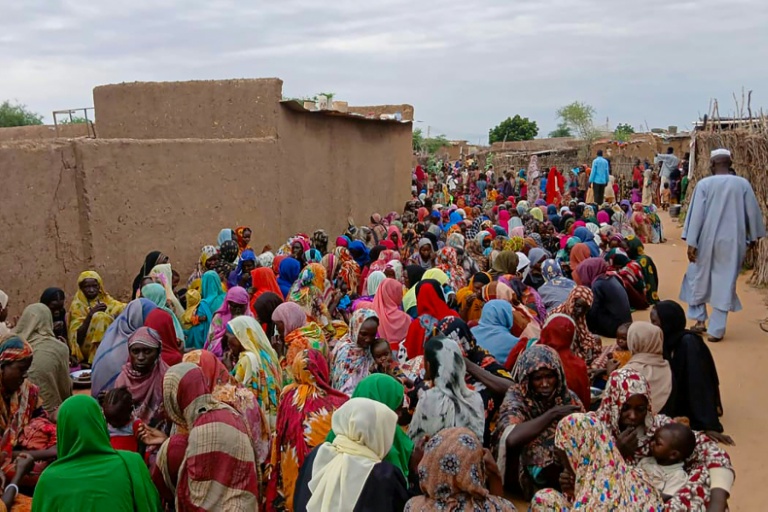World
Fighting Erupts in El-Fasher as Civilians Face Dire Situation

Fighting erupted in the city of El-Fasher, Sudan, as the Rapid Support Forces (RSF) claimed control following a prolonged siege. The violence has raised urgent concerns for the safety of civilians trapped in the city, which has experienced relentless conflict for the past 18 months. The paramilitary group announced its capture of El-Fasher, the last state capital in Darfur yet to fall under their influence, intensifying fears of escalating human rights violations.
The governor of Darfur, Minni Minnawi, aligned with the Sudanese army, called for immediate measures to protect civilians. Reports from pro-democracy activists indicated fierce fighting near El-Fasher airport and various locations west of the city. The local resistance committee highlighted a “complete absence of air support,” leaving residents vulnerable to ongoing hostilities.
Communications in El-Fasher have been severely disrupted, resulting in a media blackout, as stated by the Sudanese Journalists’ Syndicate. The United Nations’ migration agency reported that between 2,500 and 3,000 people fled the city on Sunday, searching for safety in the surrounding areas of Tawila and Mellit. The humanitarian crisis is deepening, with the UN’s Office for the Coordination of Humanitarian Affairs (OCHA) urging for safe passage for civilians caught in the crossfire.
Despite assurances from the RSF regarding civilian safety, the local resistance committee accused them of committing serious atrocities. Since the onset of the fighting, civilians have reportedly faced “the worst forms of violence and ethnic cleansing.” Concerns have also been raised regarding the safety of journalists, including independent reporter Muammar Ibrahim, who has been detained by RSF forces.
The RSF’s actions follow a history of violence against non-Arab communities in Sudan. In 2023, the group was implicated in the massacre of between 10,000 and 15,000 members of the Masalit community in El-Geneina. The recent escalation in El-Fasher marks a significant turning point in Sudan’s ongoing conflict, which has already resulted in the deaths of tens of thousands and displaced nearly 12 million people.
If confirmed, the RSF’s takeover of El-Fasher would solidify their control over all five state capitals in Darfur, potentially leading to a partition of Sudan. The Sudanese army currently retains control over the north, east, and center, while the RSF dominates Darfur and parts of the south.
The humanitarian situation in El-Fasher remains dire, with approximately 260,000 civilians, half of whom are children, stranded without adequate assistance. Four UN agencies have warned that thousands of malnourished children are at “imminent risk of death” due to the collapse of health services, as killings, sexual violence, and forced recruitment continue unabated.
Famine conditions have been declared in several displacement camps around the city, and the UN has issued warnings that these conditions could extend to El-Fasher, where residents have resorted to consuming animal fodder. There is also a looming threat of targeted massacres against non-Arab communities, reminiscent of past atrocities following the RSF’s capture of the Zamzam camp in April.
Elsewhere in Sudan, violence has escalated in North Kordofan, specifically in the city of Bara, where the RSF reportedly regained control from the army. The Emergency Lawyers, a war-monitoring group, accused the RSF of conducting a “horrific massacre” following the military’s retreat, with reports of mass executions and widespread destruction amid total communications blackouts.
As the conflict extends into its third year, the UN characterizes the situation as the world’s largest displacement and hunger crisis. Despite international calls for a ceasefire, both the army and the RSF remain entrenched in their positions, unwilling to engage in negotiations. The situation in El-Fasher underscores a critical need for immediate humanitarian intervention and international attention to protect vulnerable civilians caught in the turmoil.
-

 Science2 months ago
Science2 months agoToyoake City Proposes Daily Two-Hour Smartphone Use Limit
-

 Health2 months ago
Health2 months agoB.C. Review Reveals Urgent Need for Rare-Disease Drug Reforms
-

 Top Stories2 months ago
Top Stories2 months agoPedestrian Fatally Injured in Esquimalt Collision on August 14
-

 Technology2 months ago
Technology2 months agoDark Adventure Game “Bye Sweet Carole” Set for October Release
-

 World2 months ago
World2 months agoJimmy Lai’s Defense Challenges Charges Under National Security Law
-

 Technology2 months ago
Technology2 months agoKonami Revives Iconic Metal Gear Solid Delta Ahead of Release
-

 Technology2 months ago
Technology2 months agoSnapmaker U1 Color 3D Printer Redefines Speed and Sustainability
-

 Technology2 months ago
Technology2 months agoSolve Today’s Wordle Challenge: Hints and Answer for August 19
-

 Technology2 months ago
Technology2 months agoAION Folding Knife: Redefining EDC Design with Premium Materials
-

 Business2 months ago
Business2 months agoGordon Murray Automotive Unveils S1 LM and Le Mans GTR at Monterey
-

 Lifestyle2 months ago
Lifestyle2 months agoVictoria’s Pop-Up Shop Shines Light on B.C.’s Wolf Cull
-

 Technology2 months ago
Technology2 months agoApple Expands Self-Service Repair Program to Canada









